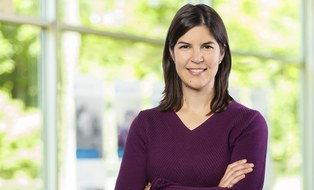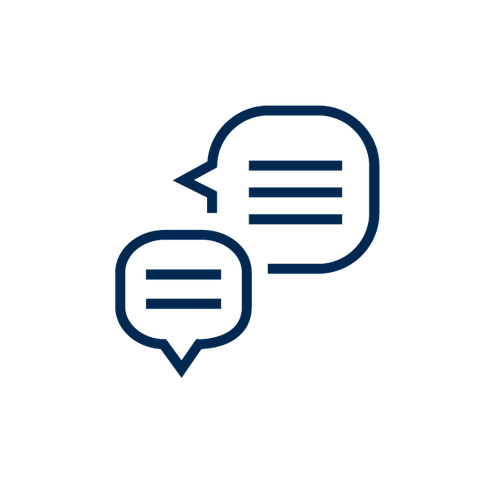Network Promoting Language competencies in Academic Studies
Table of contents
Who we are and what our concern is:
The network "Sprach(en)kompetenzen im Studium fördern" was founded by Michael Dobstadt (Professorship for German as a Foreign Language), Nina Melching (Project Writing Center@TUD) and Monika Ruszó (Teaching Center for Languages and Cultures); and thus by actors who have been dealing with the topic "Language(s) in Studies" from different professional perspectives for many years. For example, the Writing Center has been supporting teaching on the topic of scientific writing and scientific language for several years with workshops and writing advice integrated into courses. In its courses, the Teaching Center Languages and Cultures familiarizes students with German as a language of science in all its facets. In the courses of the DaF professorship, language awareness and language reflection are trained; and students are sensitized to the multi-layered connection between form and meaning as a central point of reference for contemporary language teaching.
The starting point of our initiative is a series of observations:
- Students' linguistic prerequisites have become more heterogeneous. The hurdles for acquiring the general, scientific, and technical language skills needed to comprehend and process complex specialized texts, to write academic texts, to communicate according to the conventions of the respective professional community, in other words, to study successfully and, moreover, to participate in - international and thus multilingual - scientific discourse, have increased. This no longer affects only international students.
- At the same time, the linguistic-communicative demands on students and graduates have grown: the ability to deal with language(s) in a reflective, responsible, context-sensitive, situation- and subject-appropriate and also creative way has increasingly become a prerequisite not only for successful work in academia, but also for activities in many other academic and non-academic professions, and this across disciplines.
From these findings, we draw the conclusion that students - both the so-called "international" ones and those with German as their first language - should be offered continuous (scientific and subject-related) language support at TUD in the acquisition and development of their scientific language skills; in German and other languages. Among other things, this means that the teaching of subject content should be accompanied by explicit teaching of scientific and subject-specific language skills. This includes, for example, making students aware of the specifics of scientific language compared to everyday language. Specific scientific and technical language actions should be reflected and practiced in the reading and writing process. These exercises should be an integral part of the courses themselves.
What we want to achieve:
- We would like to initiate a university-wide discourse on the importance of language competence in studies.
- We would like to develop didactic/methodological approaches to promoting language competency and, in doing so, bring together the expertise available at the TUD and make it fruitful.
- In particular, we would like to win partners in the faculties: Deans of Studies, student members of the study commissions, teachers who share our concern. We would like to establish contacts and cooperations in the different faculties and across the university with the aim of identifying needs, to interest further actors in the concerns of the network, to sensitize them to the necessity of a more intensive examination of language and communication in the context of studies and science, to further develop our concepts together with them, to carry them into teaching and to anchor them there.
- In the medium and long term, we want our network to provide impulses for the development of a contemporary language policy concept for the TUD and to actively participate in the development of such a concept.
Promoting language competences in academic studies - some say...
Subject-specific competencies are always conveyed through language. In this respect, technicality and language are inseparably linked - both in studies and teaching as well as in science in general. The teaching of terminology and specialized vocabulary, as well as the training of the ability for linguistic abstraction and coherent argumentation, are already a natural part of university teaching. If language competencies are a prerequisite for students to benefit from subject teaching and to express their acquired subject competencies, this implies that good teaching is impossible without linguistically competent students. Leaving students alone to acquire this elementary competence is risky for three reasons:
- Students may not recognize that they have language deficits.
- Students know they have language deficits but cannot identify the cause.
- Students know that they have language deficits and why, but do not know how to improve.
Supporting the development of students' language competencies through mentoring is not only effective, it is also in line with the TUD's teaching mission statement: "The goal [of teaching] is to develop high levels of subject-specific and interdisciplinary competencies" (TUD Teaching Mission Statement, p.1). If the TUD strives not only to educate its members professionally, but also to enable them to actively participate in professional, university, and social discourse, it has an obligation to provide a broad spectrum of language-related (continuing) education programs in light of the generally increased demands on the use of language and communication. The positive result of these efforts would be the development of an appealing unique selling point with the potential to attract (international) students and scientists to the TUD and to keep them there in the long term.
It would be fatal to exclude the teaching of language skills from the curriculum. Developing general technical and scientific language skills in as many languages as possible contributes greatly to the academic and later professional success of all students. This is even more true for international students whose native language is neither German nor English. In view of the growing heterogeneity within the student body in terms of educational background and origin, training in this interdisciplinary key competence ultimately results in more equal opportunities. However, not only students but also teachers benefit in the long term from a well thought-out and effective language concept. An appropriate educational offering for the broad masses increases the quality of student contributions and reduces the number of students who turn into "problem cases" when it comes to supervising term papers and theses. Furthermore, targeted instruction reduces students' fear of writing and presenting, which in turn prevents stress and overwork. Students work with greater motivation and find pleasure in actively participating in academic discourse.
The fact that students, despite busy schedules, fundamentally view language study and foreign language acquisition as a broadening of horizons is reflected, among other things, in the high numbers of participants in voluntary LSK language courses. This implies that students are motivated to increase their international mobility and work towards gaining experience abroad in the long term.
Nevertheless, it is a fact that students and faculty already feel overwhelmed by the existing teaching and learning workload. Perspectively, a streamlining of the curricula in favor of maintaining the quality of teaching as well as an adaptation to the changed conditions of the labor market would be desirable. In the meantime, one approach to solving the problem of teaching language skills could be to hand them over to experts from outside the area of study, such as the SZD or LSK. As a positive side effect, this measure could already lead to a reduction in some seminar schedules, in which the teaching of language and writing competencies had to be accommodated "on top". With regard to the additional workload of students, such courses could initially be optional or creditable for the elective/AQua/supplementary area.
Language skills are the key to the development of all communicative and academic competencies. Those who can write, present, read, and communicate well are more successful in their studies and careers. On the other hand, the fear of academic writing, for example, often leads to dropping out of studies (cf. Wisniewski et al.). Those who are not prepared to directly promote language competence that is sufficient for teaching will have to fight symptoms later on instead of addressing a cause right away.
At the same time, teaching language competencies does not necessarily have to be excessively time-consuming and costly. Much would already be achieved by adapting existing university structures and more active cooperation between the various institutions. Furthermore, initiatives such as institutionally anchored peer learning programs could keep the financial outlay low.
Indeed, actively integrating multilingualism into teaching would be a mammoth project. In perspective, a potential solution could consist in increased integration of the human and knowledge resources available through the LSK and the language faculties.
Regardless of what concepts are developed in the future to strengthen multilingualism in university education, two basic problems are currently emerging in the collective mindset:
First, the equation of English-ness with multilingualism and internationalization. Although English-language proficiency is undoubtedly a crucial factor in the internationalization of scholarly communication, it by no means guarantees equal access to educational content (cf. Flessner p. 383 f.). Nor can the Anglo-American scientific tradition claim inherent superiority over other European as well as non-European scientific cultures. In this respect, the role of the university is also that of defender of the diverse linguistic cultures of the individual disciplines by actively resisting their displacement and standardization. The responsibility of the TUD refers especially to the languages of the region (German, Sorbian, Polish, Czech). As an institution, however, it also appreciates all other European and non-European languages in which its members are at home (in the winter semester 22/23, the students alone came from 125 nations (cf. (TU Dresden, Dezernat 7, slide 3)).
Second, while diversity is generally perceived as enriching, linguistic diversity has negative connotations. Instead of viewing multilingualism as a potential "problem," it is important to create an awareness of multilingualism as a strength from which students and faculty alike benefit. The range of languages represented at the university contributes significantly to its intellectual vitality. This existing multilingualism must be recognized, understood as a resource and promoted accordingly.
Multilingualism is an indication of a genuinely pluralistic society, a prerequisite for equal participation, both a gain and a challenging task. A university that faces up to the latter serves as an inspiration and testing laboratory for successful coexistence in our post-migrant society.
Unfortunately, no. The work done so far is very valuable, but it is far from being able to cover the existing needs in the student body (and the teaching staff).
A general offer must always be supplemented by the teaching of subject-specific aspects. However, appropriate courses do not exist in every degree program.
The teaching of interdisciplinary language competencies is spread across many different institutions, where, in turn, not all areas of need can be satisfactorily met due to limited staff and financial resources. And despite the intensive efforts of individuals to increase cooperation, it is not possible to achieve uniform work under the given circumstances. The situation is further complicated by the fact that some of the institutions mentioned are projects whose terms are about to end. Thus, there is a further shortage of offerings.
The chaos of administration and responsibilities, as well as the discontinuity of services, give the impression of a lack of reliability to the outside observer; internally, they lead to frustration among the employees and, as a result, to "brain drain".
With an overall concept and an overall structural change at the TUD, much more could be achieved.
Flessner, Axel. „Sprachpolitik für die Internationalisierung der Hochschulen in Europa“. Die öffentliche Verwaltung (DÖV), Bd. 72, Nr. 10, may 2019, p. 373–416.
Kobel, Michael. Entwurf Lehrleitbild im Rahmen der Lehrstrategie sTUDium 3.0. TU Dresden, 20th june 2022, https://tu-dresden.de/tu-dresden/organisation/rektorat/prorektor-bildung/lehrstrategie/ressourcen/dateien/230920_Inhalt_de_bf.pdf
TU Dresden, Dezernat 7. TU Dresden: Die sächsische Exzellenzuniversität. Kurzpräsentation. https://tu-dresden.de/tu-dresden/profil/ressourcen/dateien/zahlfakt/tud_kurz_2023_02_DE.pdf?lang=de.
Wisniewski, Katrin, et al. Wie wichtig sind Deutschkenntnisse für ein erfolgreiches Studium internationaler Bachelorstudierender? Kernbefunde des SpraStu-Projekts. Deutscher Akademischer Austauschdienst (DAAD), 2023, https://doi.org/10.46685/DAADStudien.2023.03.
 © TUD
© TUD
Netzwerk Sprach(en)kompetenzen im Studium fördern
Send encrypted email via the SecureMail portal (for TUD external users only).
Executive Director LSK & Language Advisor for German
NameMs Monika Ruszó
Coordinator Test-DaF / DSH examinations
Send encrypted email via the SecureMail portal (for TUD external users only).
Teaching Centre for Languages and Regional Studies (LSK)
Visiting address:
Seminargebäude 1 (SE1) Zellescher Weg 22
01217 Dresden
 © Crispin-I. Mokry
© Crispin-I. Mokry
Consultant for Writing Didactics
NameNina Melching-Strathe, M.A.
Writing Center Team Leader | Services for Teachers
Send encrypted email via the SecureMail portal (for TUD external users only).
Center for Continuing Education
Center for Continuing Education
Visiting address:
Fritz-Foerster-Bau, 5th floor, room 557 Mommsenstr. 6
01069 Dresden


